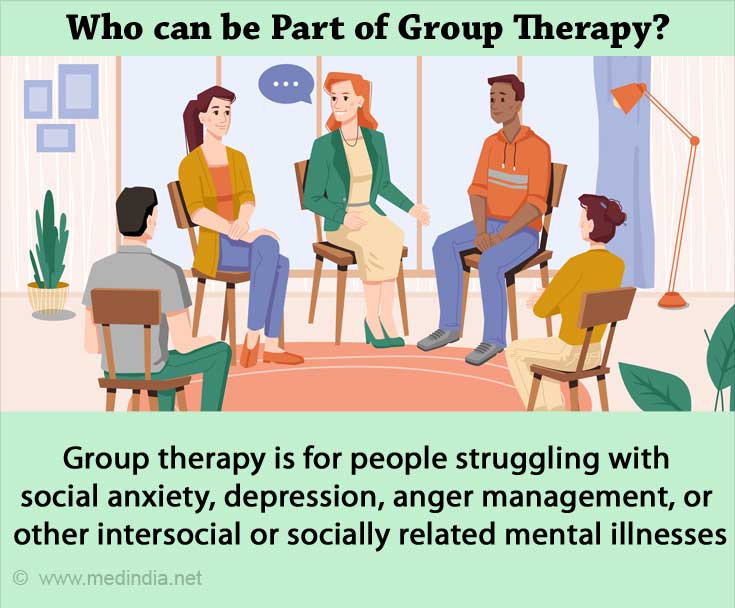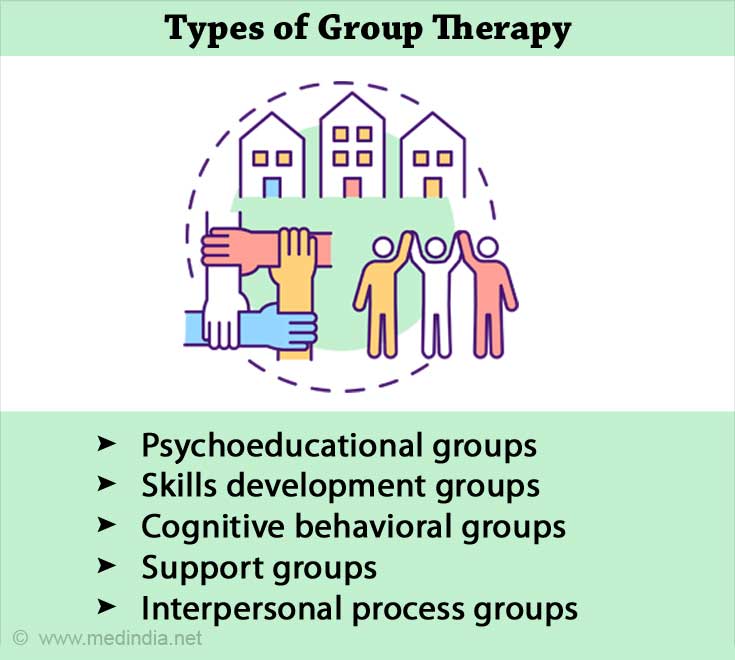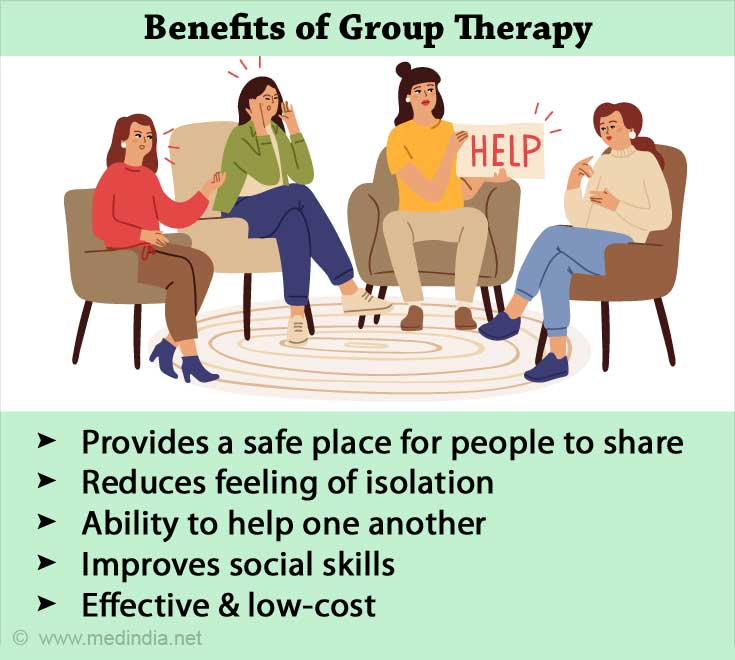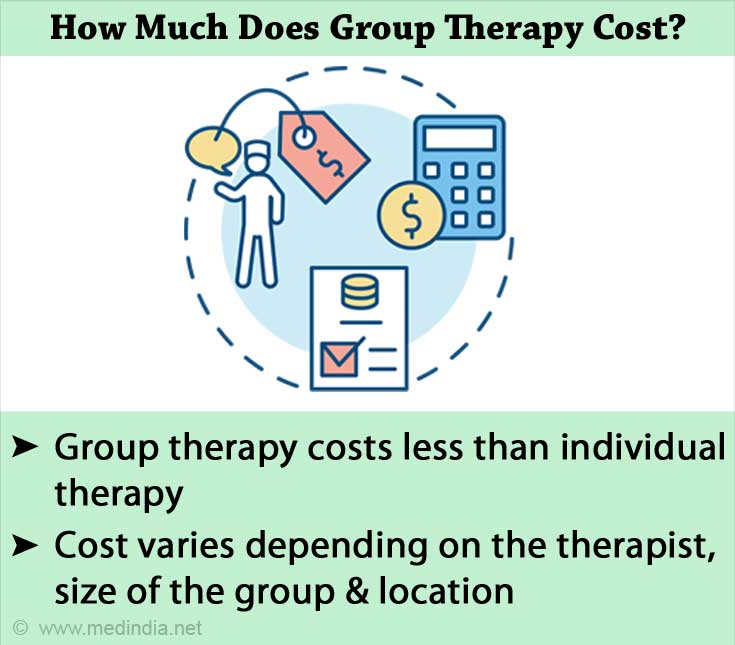- Psychotherapy: Understanding group therapy - https://www.apa.org/topics/psychotherapy/group-therapy
- Group therapy - https://tavistockandportman.nhs.uk/care-and-treatment/treatments/group-therapy/
- International Journal of Group Psychotherapy - https://www.researchgate.net/journal/International-Journal-of-Group-Psychotherapy-1943-2836
- Group Therapy Article - https://www.statpearls.com/ArticleLibrary/viewarticle/22447
What is Group Therapy?
Group therapy is a form of psychotherapy that involves one or more mental health practitioners who deliver psychotherapy towards several individuals in each of the sessions. Group therapy can reduce wait times and give more people access to reliable mental healthcare. Some people can also attend individual therapy sessions in addition to group therapy, while others exclusively use group therapy.
Who is Group Therapy for?
Anyone can attend a group therapy session. However, group therapy can be beneficial for people with limited access to mental healthcare, such as those living in rural or low-income areas where the healthcare clinics are very understaffed.
One of the major goals of group therapy is about bringing people who do share similar experiences. Group therapy primarily focuses on a specific mental health concern, such as social anxiety or even depression.
Some other examples of conditions a group therapy may focus on do include the following:
- Phobias
- Depression
- Attention deficit hyperactivity disorder (ADHD)
- Substance use disorder
- Generalized anxiety disorder
- Post-traumatic stress disorder
- Panic disorder

Group therapy can also help people with:
- Grief
- Obesity
- Chronic pain
- Weight loss
- Anger management
- Domestic violence
- Cultural trauma
- Chronic illness
How Group Therapy Works
Instillation of hope
Therapists can even instil hope in the group members by acknowledging that current and former members progress toward their respective goals. Groups will usually consist of people at the different stages of treatment. So, watching people who are currently experiencing or even recuperating from a similar problem gives other group members hope that they will also have positive treatment outcomes.
Universality
Group therapy brings along people who have similar experiences together. Meeting other people recovering from or working through similar issues does help people realize that they are not alone. Understanding the universality of their experiences can even help people overcome physical and emotional isolation.
Imparting information
Group members and therapists can certainly help each other by way of sharing information and even offering advice.
Altruism
Group members can support, reassure, and more so help each other improve throughout the treatment. This improves their self-esteem, morale, and confidence. It leads to the corrective recapitulation and repetition of the primary family group.
Therapy groups often resemble family groups, with, say, one or two parental authority figures and even peer siblings. Please note that within the group therapy sessions, people do confront and challenge their early childhood experiences and dynamics with these very “parents and siblings.” They can also learn how these early experiences shape their personality and identify which behaviors and beliefs are unhelpful or destructive in their respective lives.
Development of socializing techniques
The group therapy members do give and even receive corrective and restorative feedback that can help them engage and immerse in the social interactions outside the very group.
Imitative behavior
Members of the group do resemble the behaviors they do observe in more senior members or therapists. As a result, the group members can go on to obtain a better understanding of themselves.
Interpersonal learning
The therapy group reflects and considers the individual’s social universe as well. Through solid feedback and self-observation, group members can completely understand the strengths and limitations of their interpersonal behavior.
Group cohesiveness
As a part of a group with a common goal; members can move to gain a sense of belonging too. Members may feel quite comfortable opening up to the group as a result. They may also be very willing to implement the behavioral changes they teach as a part of the treatment.
Catharsis
By sharing their feelings, experiences, and pain with a group, one can help people release anger and even pent-up emotions.
The process can then lead to sudden insights that do a shift in ways that people do perceive and respond towards life.
Existential factors
Group therapy sessions provide the space and the time for people to explore the uncomfortable existential factors, such as loss of loved ones. Group members develop a stronger sense of self-reliance by learning to understand that they are ultimately in the control of their behaviors, actions, and more so choices.
“My routines come out of total unhappiness. My audiences are my group therapy.” - Joan Rivers
What are the Different Types of Group Therapy?
It is vital to note that there are several different types of group therapy, and the treatment models do vary from group to group.
Let us look at the core outline of five of the most common types of group therapy:

1. Psychoeducational groups
Psychoeducational group therapy does focus on educating members about their conditions and providing them with new coping strategies. These groups usually focus on a specific condition, such as substance use disorder, anxiety, or even phobias.
2. Skills development groups
Skills development groups focus on introducing and improving the skills that the members need to cope with while dealing with certain mental health conditions. These groups may even incorporate aspects of psychoeducational groups. Still, the overall goal involves strengthening the very members through behavioral and cognitive resources to help them make positive choices and avoid harmful situations.
3. Cognitive behavioral groups
4. Support groups
Support groups can even help people cope with significant life changes, such as the loss of a loved one. In the support groups, the members do give and even receive unconditional acceptance. The group also encourages its members to totally reflect and review their personal beliefs and behaviors.
5. Interpersonal process groups
The interpersonal process group model does use the psychodynamic approach to promote positive change. Psychodynamics is indeed a school of psychology that views a person’s early life experiences and subconscious beliefs and feelings to be the foundation of their personality and behaviors. Interpersonal process groups do focus on interpersonal group dynamics and less on individual psychology.
Is Group Therapy Effective?
Group therapy appears to be quite effective for depression.
Group therapy for depression concludes that group treatment can lead towards significant improvements at both the group and an individual level.
The positive effects of group therapy can even be seen on substance use disorders. It is found that group therapy has a moderate impact on the mental state compared with no treatment and that people in group therapy are more likely to abstain and refrain from future substance use than those not enrolled in the treatment.
Benefits: Group Therapy may provide:
- A safe place for people to share their feelings and exploring the nature of their mental health condition
- A place to receive support from and then give support to others who are experiencing similar difficulties

- Exposure towards new behaviors, thoughts, and beliefs that may shift people’s perspectives
- A place where people do feel that they are not alone
- Absorbing positive support systems
- A more affordable and cost-effective alternative towards one-on-one therapy sessions
What to Expect
Group therapy involves one or more psychologists who do lead small groups with, up to 15 members. Group sessions meet once per week and do last for around 1–2 hours.
Group therapy sessions can occur in healthcare settings and community centers, such as therapy offices, hospitals, and even libraries. Groups will also meet in a quiet room with the chairs in a circle so that the group members can see each other.
At the beginning of a session, group members will introduce themselves and share their very reasons for attending the group therapy. They may also discuss their same progress and any obstacles or setbacks that they have experienced since the very last meeting.
The exact activities in the group therapy sessions will go on to vary from group to group. However, such activities tend to focus on promoting open, honest communication and establishing strong trust between group members and their psychologists.
How to Find Group Therapy
People can find certified group therapists through psychotherapy websites. Also, those who are currently working with a mental healthcare practitioner can even ask for referrals or recommendations.
Factors to consider:
People may want to even consider the following factors when searching and more so observing for the group therapy:
- Whether or not they do wish to join a group that does focus on a specific experience or even a mental health condition
- Whether or not they do prefer the certain group therapy models
- Whether they want to attend the group therapy sessions in person or online
- Whether or not they do feel more comfortable talking to people from similar backgrounds as them
Cost, Coverage and Affordable Options
Group therapy costs vary while depending on the therapist, the very size of the group, and even the location. Group therapy usually does cost less than individual therapy because the therapist will always work with multiple people at once.

Summary
Group therapy offers an alternative to individual therapy.
In group therapy sessions, the people can meet others who share very similar experiences. One or more certified psychologists say even the other mental healthcare practitioners do lead the group therapy sessions.
There are many different types of the group therapy model. However, most groups tend to focus on introducing members to new and more positive behaviors to better cope with the significant life events and even mental health symptoms.
“One of the most valuable things we can do to heal one another is to listen to each other’s stories.” -Rebecca Falls








